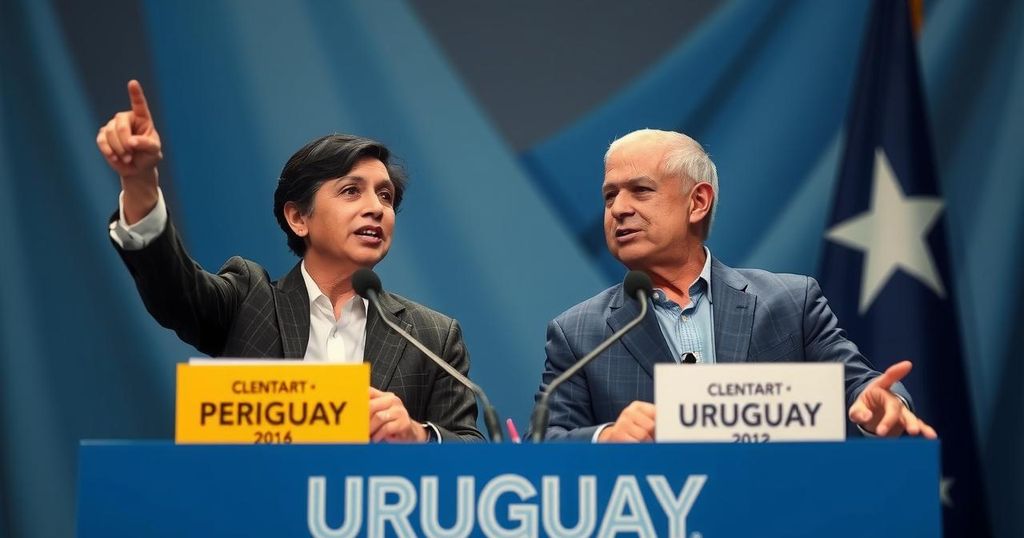Uruguay’s Presidential Election: A Reflection of Stability and Moderation Amidst Regional Turmoil

Uruguay held a presidential election featuring two moderate candidates, maintaining its tradition of political stability. With over 88% voter turnout, the election focused on a referendum regarding social security reform. Voters expressed a mix of satisfaction and indifference towards the candidates, amidst broader societal concerns that could impact political engagement moving forward.
On Sunday, voters in Uruguay participated in a presidential election featuring two moderate candidates, maintaining the country’s reputation for political stability amidst regional tumult. The election saw 2.7 million eligible voters choose between the incumbent center-right coalition and a center-left challenger, also casting ballots for Parliament and a significant referendum regarding social security reform. Turnout was robust, exceeding 88%, credited to Uruguay’s mandatory voting laws. The referendum, which proposed to overhaul the pension system—potentially expanding the fiscal deficit—has garnered considerable media focus compared to pressing issues like child poverty and education. Given the consensus between the candidates on many policies, major shifts in governance are not anticipated in a nation of 3.4 million that is perceived as a model of democracy. Juan Cruz Díaz, a political analyst from Buenos Aires, remarked, “In a way, Uruguay has been boring, but boring in this sense is very good,” contrasting it with the political upheaval seen in neighboring countries. The current president, Luis Lacalle Pou, has maintained a favorability rating of 50%, indicating general public satisfaction. On polling day, the Rambla, Montevideo’s waterfront promenade, transformed into a vibrant hub as supporters from both coalitions celebrated democracy. Álvaro Delgado, the ruling coalition’s candidate and former chief of staff, expressed pride in the election’s atmosphere, asserting on social media, “We voted with joy in a very special election…” His opponent, Yamandú Orsi, a former mayor representing the Frente Amplio coalition, also underlined the significance of Uruguayan democracy, citing the country’s 40 years of uninterrupted electoral freedom. Orsi, who leads in polls but is not expected to achieve an outright majority, also enjoys the endorsement of former President José Mujica, who played a pivotal role in establishing Uruguay as a socially progressive nation. In contrast to the leading candidates, Andrés Ojeda’s unconventional candidacy has energized some young voters, even as the general public expressed indifference toward the traditional political platforms. Despite concerns such as rising crime rates and child poverty affecting one in five Uruguayan children, the election lacked engagement typically associated with competitive politics. The referendum on the proposed changes to the social security system, backed by unions, aims to lower the retirement age and increase pension payments. In conclusion, while Uruguay’s elections reflect an atmosphere of moderation and consensus, underlying issues remain that could influence future governance and societal welfare. Voter turnout and enthusiasm amid basic system reforms highlight the intricate interplay between democratic processes and public satisfaction in this stable South American nation.
Uruguay has earned a reputation for its political stability in a region often marked by division and democratic crises. The current election signifies a continued trend of moderation, contrasting sharply with the political climates of Brazil and Argentina, where public sentiments have led to heightened volatility. The country’s electoral system is characterized by mandatory voting, ensuring robust participation among citizens. As the elections approach, key issues have emerged, particularly the proposed social security overhaul, which aims to address financial security for retirees without alarmingly increasing the national deficit.
In summary, Uruguay’s election illustrates a strong commitment to democratic ideals and political stability, with voter turnout exceptionally high amidst a race that prioritizes moderation over strife. The reflective nature of this electoral process, coupled with pressing social issues, underscores the importance of continued civic engagement in shaping Uruguay’s future.
Original Source: www.pbs.org








